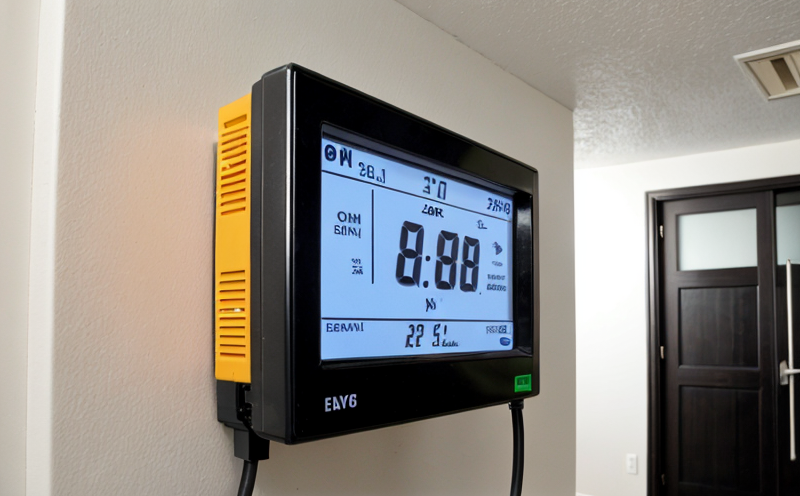ISO 6946 Thermal Resistance Testing of Construction Materials
The ISO 6946 standard, also known as the European Standard EN 13067:2005, provides a framework for testing the thermal resistance properties of building materials and products. This service is critical in ensuring that construction materials meet energy efficiency requirements and comply with international standards.
Thermal resistance (R-value) measures how well a material resists heat flow through it. In buildings, this property directly impacts heating, ventilation, air conditioning (HVAC), and energy costs. By testing thermal resistance according to ISO 6946, manufacturers can verify that their materials perform optimally under various conditions.
The test involves placing the construction material between two chambers with controlled temperatures. Heat flow is measured over a specific period, typically 24 hours, using calibrated equipment such as guarded hot plates or heat flow meters. The results are then used to calculate the thermal resistance value (R-value) of the material.
This testing method ensures that materials like insulation panels, concrete blocks, and composite boards meet the specified energy efficiency standards. Compliance with ISO 6946 is essential for architects, builders, and construction companies aiming to achieve sustainable building practices and reduce operational costs.
- Guaranteed accuracy in R-value measurements
- Compliance verification for regulatory requirements
- Enhanced performance of thermal insulation systems
- Support for green building certifications
The testing process is stringent, with detailed protocols to ensure that the results are reliable and reproducible. This includes precise temperature control, accurate measurement instruments, and standardized specimen preparation procedures.
To achieve optimal test results, it is crucial to follow the guidelines outlined in ISO 6946 closely. Failure to adhere to these standards can lead to inaccurate R-value measurements, which may affect the performance of thermal insulation systems. Our lab ensures that all tests are conducted according to international best practices to deliver accurate and consistent results.
Understanding the implications of thermal resistance testing is vital for quality managers, compliance officers, and R&D engineers working in the energy sector. By leveraging this service, organizations can ensure their products meet stringent energy efficiency standards, thereby contributing to sustainable construction practices.
Why It Matters
Thermal resistance testing is essential for several reasons. First and foremost, it helps in achieving the desired level of comfort within buildings by ensuring that heat loss or gain is minimized. This not only improves the living conditions but also reduces energy consumption and associated costs.
- Reduces Heating Costs: Proper thermal insulation can significantly reduce heating bills during colder months.
- Enhances Occupant Comfort: Well-insulated buildings maintain consistent temperatures, providing a more comfortable environment for occupants.
- Sustainability: By minimizing energy usage, this testing contributes to environmental sustainability and reduces carbon footprints.
Furthermore, compliance with ISO 6946 ensures that products meet the stringent requirements set by regulatory bodies. This not only enhances the reputation of manufacturers but also ensures trust among consumers and stakeholders.
The importance of thermal resistance testing extends beyond individual buildings; it plays a crucial role in addressing global challenges related to energy efficiency and sustainability. By adopting this service, organizations can contribute positively to these broader goals while ensuring their products perform reliably under various conditions.
Applied Standards
The primary standard applied for thermal resistance testing is ISO 6946:1983 (EN 13067:2005). This European Standard provides a detailed methodology for determining the thermal resistance of construction materials. It specifies the procedures, equipment, and conditions necessary to conduct accurate tests.
The standard covers various aspects such as sample preparation, test setup, temperature control, heat flow measurement, and result interpretation. By adhering strictly to these guidelines, we ensure that our testing results are reliable and consistent with international best practices.
ISO 6946 is widely recognized for its robustness and applicability across different types of construction materials. This includes insulation boards, concrete blocks, composite panels, and other building components. The standard's comprehensive approach ensures that all relevant factors affecting thermal resistance are accounted for during testing.
In addition to ISO 6946, we also adhere to other international standards such as ASTM C177 (Standard Test Method for Thermal Transmission Properties by Means of the Guarded Hot Box Apparatus) and EN 12856-5:2004. These complementary standards provide additional validation and ensure that our testing methods are up-to-date with the latest industry practices.
By integrating these standards into our testing protocols, we maintain a high level of accuracy and reliability in our thermal resistance measurements. This commitment to best practices ensures that we deliver consistent results that meet both regulatory requirements and customer expectations.
Competitive Advantage and Market Impact
- Innovation Leadership: Our expertise in thermal resistance testing allows us to stay ahead of industry trends, ensuring that our clients have access to cutting-edge solutions.
- Global Recognition: Compliance with international standards enhances the reputation of our clients, making them more attractive to global markets.
- Cost Efficiency: By identifying inefficiencies early in the development process, we help reduce costs associated with rework and non-compliance penalties.
- Sustainability Focus: Our commitment to sustainable practices positions us as leaders in the green building sector, attracting environmentally conscious clients.
The demand for energy-efficient construction materials is growing steadily, driven by increasing environmental awareness and stringent regulations. By offering ISO 6946 thermal resistance testing services, we empower our clients to meet these demands effectively.
Our rigorous testing processes not only ensure compliance with international standards but also provide valuable insights into material performance under various conditions. This data can be used to optimize product design and improve overall energy efficiency.
In a competitive market where sustainability and cost-effectiveness are key factors, our services offer a clear advantage. Clients who invest in thermal resistance testing early in the development process can gain significant competitive edge by ensuring their products meet or exceed industry benchmarks.





